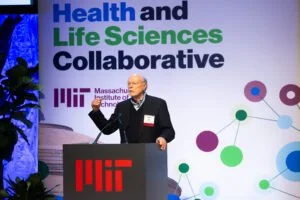May Bulletin
Issue 104
Community Notices
REGISTRATION OPEN: Annual Marble Center poster symposium on Tuesday May 20th (Luria Auditorium)
The poster symposium will convene members of the Koch Institute for Integrative Cancer Research and broader MIT community working on nano- and precision based approaches for the early detection and treatment of cancer. The event will be held at the Koch Institute Luria Auditorium on May 20, 3:30-5:30pm. This will be an in-person only event, and will be an excellent opportunity to highlight collaborative projects in this area and get feedback from faculty and industry members.
Lunch seminar with QIAGEN Thursday May 1 12-1pm (76-359)
Advancing biotherapeutics development with Dr. David Eckert on the QIAcuity Digital PCR. David earned a Ph.D. in Biochemistry and Molecular Biology at the Louisiana State University Health Sciences Center in New Orleans. After a post-doc at the University of Pittsburgh, he joined Life Technologies as a Technical Applications Scientist specializing in sample preparation. This was followed by a stint as a Field Applications Scientist, first at Bio-Rad Laboratories and then at Thermo Fisher Scientific, specializing in qPCR and digital PCR. David is currently a Business Development Manager for digital PCR at QIAGEN, focusing on development of novel applications on the QIAcuity digital PCR system.
News
The emerging era of structural nanomedicine
(Nature Biomedical Engineering) Ensuring structural control over nanomedicines, in particular, those designed to accommodate multiple functionalities, remains challenging. For example, mRNA vaccines made of lipid nanoparticles encapsulating mRNA are delivered as ill-defined co-assembled superstructures consisting of medicinal and material components. Batches of mRNA vaccines are typically characterized by average values of particle size and nucleic acid loading; structural, and thus functional, variations among particles in each batch are not known. This lack of structural definition can pose challenges in terms of regulatory approval and therapeutic optimization. It also appears to conflict with the long-standing emphasis on structural precision in the development of small-molecule drugs, where even the absence of stereochemical control, as seen in the cases of thalidomide and ibuprofen, led to significant differences in therapeutic efficacy. Read more…
Research spotlights
Nanobody-Targeted Conditional Antimicrobial Therapeutics
ACS Nano, Bhatia Lab
The Bhatia lab designed nanobody-targeted conditional antimicrobial therapeutics to deliver a model therapeutic peptide and protein to the site of bacterial infection, and report the use of targeting nanobodies to enhance the activation of therapeutics that are otherwise activated inefficiently despite extensive optimization of the cleavable linker. Read more
High-Throughput Microfluidic-Mediated Assembly of Layer-By-Layer Nanoparticles
Adv. Funct. Mat., Hammond & Irvine Labs
The research team reports a new method of polymer deposition is presented onto NPs enabled through microfluidic (MCF) mixing. Nanoparticles are mixed with polyelectrolytes using commercially available bifurcating mixer MCF cartridges. In addition to increased process robustness, MCF allows for LbL electrostatic assembly using titrated polymer-to-NP weight equivalent ratios where no excess polymer is required to achieve a given LbL layering. Under such conditions, no time-consuming purification is needed, greatly increasing LbL-NP throughput and avoiding the loss of NPs during purification. Read more
Job opportunities
Assistant Professor of Pharmaceutical Sciences, University of Wisconsin-Madison. Applicants should be knowledgeable in the general area of medicinal chemistry (such as synthesis, structure activity relationships, screening technology, and rational drug design) and/or related areas in drug discovery. The individual is expected to: 1) establish a high quality, externally funded research program in drug discovery; 2) engage in collaborative basic research with faculty in the School of Pharmacy and other campus units such as School of Medicine and Public Health; 3) participate in campus-wide initiatives in translational research; and 4) teach courses in the undergraduate, professional and graduate programs. University and community service will also be expected as appropriate.
Tenure-Track Assistant Professor Position in Pharmacokinetics, University of British Columbia. The Faculty of Pharmaceutical Sciences at The University of British Columbia (UBC) invites applications for a full-time tenure-track Assistant Professor position in Pharmacokinetics (PK), broadly defined. Our faculty’s research programs focus on many aspects of drug discovery, drug development, and drug delivery, of which pharmacokinetics plays an important role. The major focus of this position will be the development of a cutting-edge, externally funded, world-class research program. Examples of specific research areas could include, but are not limited to, innovative approaches using PK, drug transport and metabolism, clinical PK, pharmacometrics, population modelling, and mechanistic modelling. Applicants with clinical and/or industry experience are encouraged to apply. Excellent teaching and communication skills are essential. The successful candidate will teach pharmacokinetics and/or other related topics to students in the Entry-to-Practice PharmD (E2P), Bachelor of Pharmaceutical Sciences (BPSc), and M.Sc./Ph.D. programs, as well as any new programs that may be developed.
Funding opportunities
| Funding Source | Grant ID | Deadline | 2025 Koch Institute Frontier Research Program | N/A | May 14, 2025 | MIT HEALs Graduate Fellowship | N/A | June 10, 2025 |
|---|






